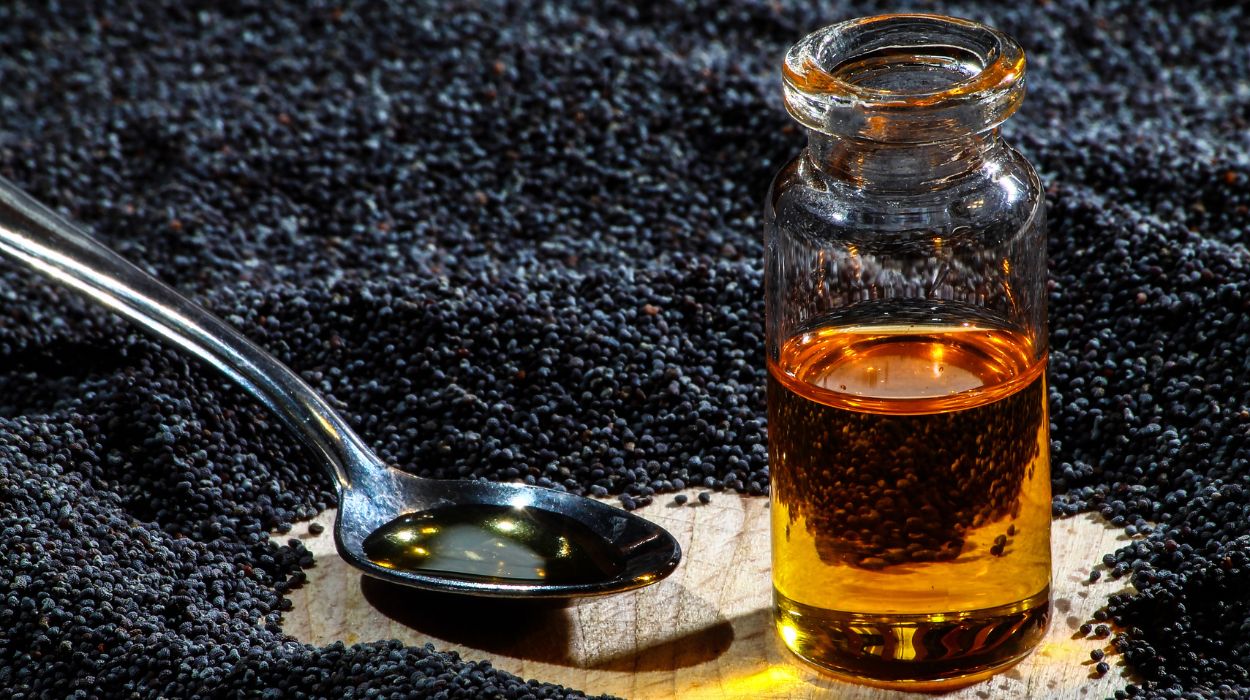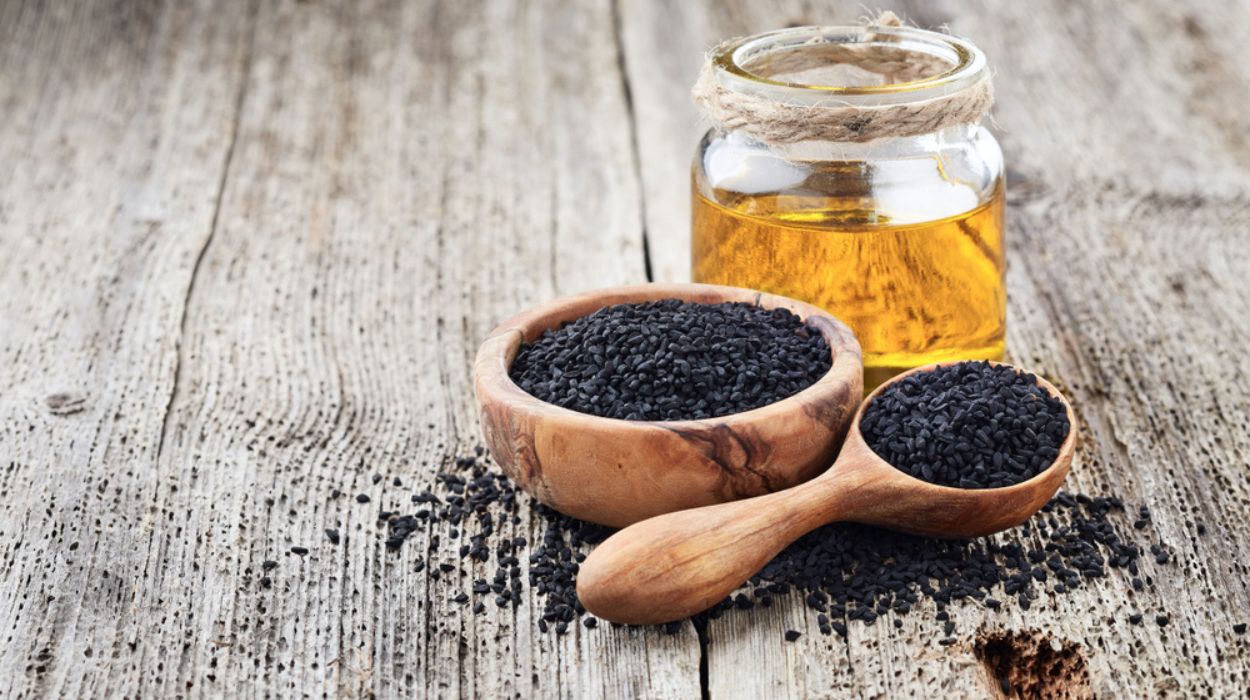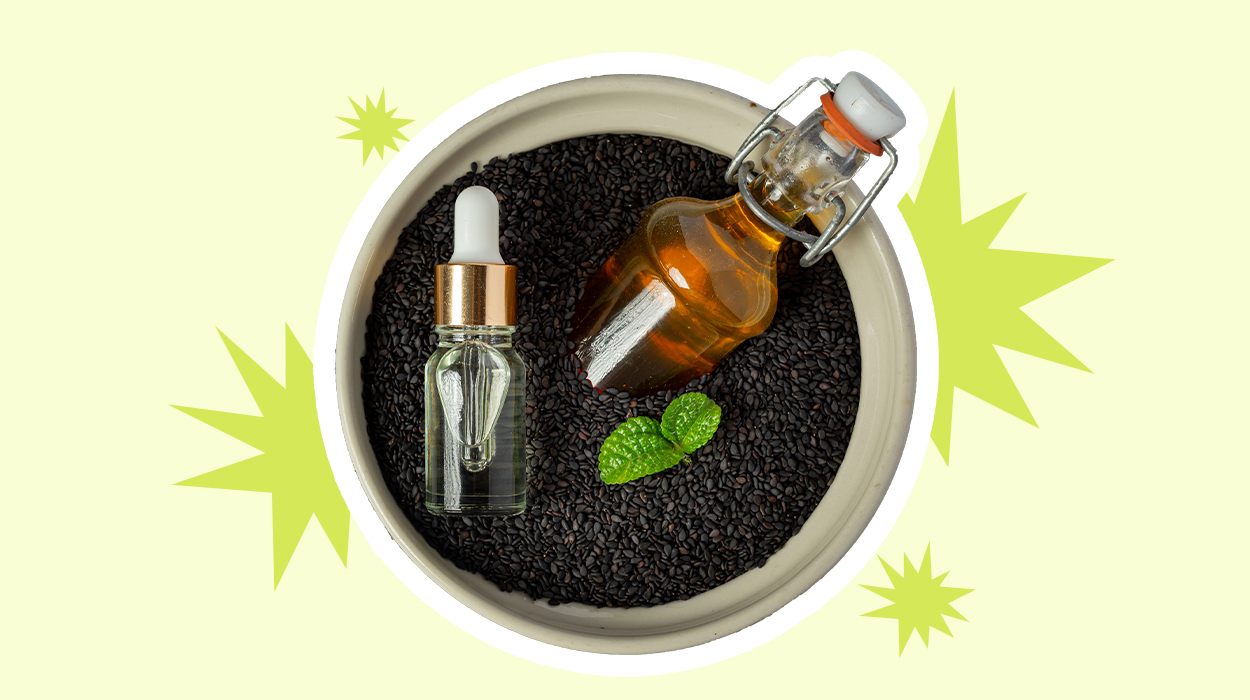Because of its powerful antioxidant properties,[1] black cumin seed oil has been used in a variety of traditional medical systems since ancient times to improve patients’ overall health and sense of well-being. The oil extracted from the seeds of the Nigella Sativa plant contains thymoquinone,[2] which has a wide range of applications and effects, including anti-inflammatory and antioxidant properties. Because of its recent popularity, more people are incorporating black seed oil into their daily routines. This article will inform you about how to use black seed oil, its various benefits, and the qualities to look for in high-quality products.
How To Use Black Seed Oil?
- Used for skin health.
- Used for hair growth.
- Used for ulcer prevention.
- Used for weight loss.
- Seed oil to alleviate pain and swelling.
- Used to increase immunity.
- Used to treat respiratory conditions.
- Used to improve cognitive function.
- Used to limit the spread of cancer cells.
How To Use Black Seed Oil?
Several scientific disciplines have investigated the possible health benefits of black seed oil. Listed below are several uses for black cumin seed oil:
How To Use Black Seed Oil For Skin

The black seed oil has been used for centuries as a natural remedy to improve skin conditions. Apply a few drops of Nigella Sativa seed oil to your skin with a carrier oil such as coconut oil or almond oil. Mix a few drops of black seed oil into your daily moisturizer or weekly face mask for extra benefits. The oil can help soothe inflamed skin, soothe sensitive skin, and reduce the appearance of fine lines and wrinkles.
How To Use Black Seed Oil For Hair Growth
Black seed oil has become a popular alternative treatment for better hair and faster hair growth. Massage a few drops of black seed oil into the scalp to stimulate hair growth. Allow at least 30 minutes, preferably overnight, before shampooing as usual. The oil promotes hair growth, reduces hair loss, and strengthens hair follicles.
How To Use Black Seed Oil For Ulcer
New research[2] indicates that the anti-inflammatory and antibacterial qualities of black seed oil make it a good candidate for treating ulcers. For ulcer relief, take one teaspoon of black seed oil diluted in one cup of warm water in the morning. Adding honey to the oil improves its internal application. Before taking black seed oil to heal ulcers, you should visit a physician. It may not be appropriate for all patients and may interact with other drugs.
How To Use Black Seed Oil For Weight Loss
Black seed oil supplements can be an effective weight-loss remedy. Some people have discovered that putting a few drops of black seed oil in a glass of water or juice and drinking it before each meal can help them lose weight. Because of its ability to promote fat burning and a healthy metabolism, black seed oil is an excellent weight loss product.
How To Use Black Seed Oil To Alleviate Pain And Swelling
For generations, black seed oil has been used as a natural pain reliever. For this purpose, black seed oil can be applied topically to the affected area or consumed orally. To apply black seed oil topically, massage a few drops into the skin of the affected area until the oil is completely absorbed. A few drops of black seed oil in a standard glass of water or juice is the best way to consume it. Black seed oil can be used to relieve pain and inflammation due to its anti-inflammatory properties.
How To Use Black Seed Oil To Increase Immunity
Black seed oil is a popular dietary supplement for immune system support. Black seed oil is an effective immune-boosting supplement due to its high content of antioxidants and other chemicals. A few drops of black seed oil added to a glass of water or juice on a daily basis can boost the immune system’s ability to fight off illness.
How To Use Black Seed Oil To Treat Respiratory Conditions
In some people, black seed oil has been shown to alleviate asthma and allergy symptoms. For this purpose, black seed oil can be taken orally or applied topically. Some claim that black seed oil’s health benefits can be obtained by adding a few drops to a kettle of boiling water and inhaling the resulting vapor. A method for ingesting the oil is to mix a few drops of black seed oil into a glass of warm water and drink it once or twice a day. Lung inflammation[3] can be reduced by using black seed oil, which has anti-inflammatory properties.
How To Use Black Seed Oil To Improve Cognitive Function
Black seed oil can help with concentration and memory. This can be accomplished by ingesting black seed oil. Black seed oil contains antioxidants and other substances that may protect the brain from oxidative stress and inflammation, thereby improving cognitive performance and lowering the risk of neurodegenerative diseases. A daily dose of black seed oil, water, or juice can improve cognitive performance.
How To Use Black Seed Oil To Limit Cancer
Black seed oil supplement has been studied for its ability to prevent cancer. When black seed oil is consumed, it has this effect. According to research, some components of black sesame oil prevent cancer cells from proliferating and spreading.
What Is Black Seed Oil?
Black seed oil, also known as black cumin seed oil, is made from the seeds of the Nigella sativa plant.[3] Because of its numerous medicinal properties, this Middle Eastern plant has been used in traditional medicine for centuries. According to research,[4] it may be effective in treating a wide range of medical conditions, including headaches, back pain, high blood pressure, infections, inflammation, asthma, and weight loss. When applied topically, the skin and hair benefit as well.
Black Seed Oil Benefits

Much research[4] has been conducted to determine whether or not black cumin seed oil has any potential health benefits. There are numerous benefits of consuming black seed oil including:
Antioxidant Effects
Because it contains antioxidant components, black seed extract oil can help reduce cell damage caused by free radicals, which is a significant benefit. By using the oil, it is possible to lower blood sugar levels. Asthma and other skin disorders can be alleviated, cholesterol levels lowered, excess weight loss, and cognitive function preserved.
Anti-inflammatory Properties
Black seed oil’s anti-inflammatory properties have been shown to have the potential to alleviate the symptoms of a variety of painful conditions, including asthma, eczema, and arthritis. These advantages, combined with its antioxidant properties, make it useful for the prevention and treatment of gastrointestinal diseases.
Cardiovascular Health
There is some evidence that black seed oil may benefit cardiovascular health in a variety of ways, such as it helps lower blood pressure and cholesterol. A black seed extract[2] has been shown to protect the heart, lowering the risk of heart attack damage and improving overall heart health.
Immune System Support
According to research, the immunomodulatory properties of black seed oil capsules benefit the immune system and reduce the likelihood of infection. In addition to boosting the immune system and fighting cancer, it is possible that black seed functions as an antihistamine and reduces swelling and allergic reactions in the body.
Digestive Health
Black seed oil has been used for centuries to aid digestion, and recent scientific research[4] suggests that it may also have digestive benefits. The anti-inflammatory[3] properties of black seed oil may help with indigestion, nausea, abdominal distention, bloating, vomiting, diarrhea, or constipation.
Tips To Use Black Seed Oil Effectively & Safely
Consider the following tips to ensure that black seed oil is used safely and effectively:
- If you’ve never used black seed oil before, begin with a very modest amount and increase it gradually to lessen the likelihood of encountering adverse side effects.
- Ensure that the black seed oil you purchase is pure, organic, cold-pressed, and of excellent quality.
- Generally, it is better to dilute essential oils with carrier oil before utilizing them.
- You may integrate black seed oil into your diet by adding it to smoothies, salad dressings, and other foods.
- Black seed oil should be kept in a cool, dark area that is shielded from direct sunshine and excessive heat.
- Always check your physician before using black seed oil, especially if you are pregnant, nursing, or taking any medications.
What To Look For When Buying Black Seed Oil?
- Slow cold-pressed: Because Nigella Sativa oil contains so many components, it should be extracted without using heat. Heat extraction may cause volatile chemicals to evaporate, lowering oil quality.
- UV-filtering glass bottle: Glass bottles are inert and better preserve oils. Moreover, glass is more environmentally friendly!
- Origin: The climate and soil of the Nigella Sativa plant influence seed quality and oil flavor. Because their climate is ideal for flowering crops, Turkish black seeds are the best in the world.
- Purity: Black seed oil should be derived from pure Nigella Sativa seed extract, which means it should be 100% pressed oil.
- Raw: To maximize the combination of healing ingredients in the oil from the entire Nigella Sativa seed, which contains significant concentrations of Nigellone in the seed skin, use unfiltered, unrefined oil.
- No-chemical extraction: Avoid oils extracted with chemicals. Chemicals such as benzene derivatives can extract more oil from each batch of seeds, but they also taint the finished product.
Conclusion
It is evident from the precedence that black seed oil provides health benefits in addition to its many practical applications. Seek for organic black seed oil that is devoid of fillers and contaminants and of superior quality. When administering black seed oil topically or orally, the most efficient way is to begin with a very low dosage and raise it gradually. If you use black seed oil in your daily life and adhere to these instructions, you will gain all of the benefits that using black seed oil has to offer.
Frequently Asked Questions
Black seed oil comes from cold-pressed seeds of Nigella Sativa. It has long been used in alternative medicine due to its potential health benefits.
Black seed oil can be taken orally, applied topically to the skin or hair, or used in aromatherapy. For the recommended dosage and administration, follow the directions on the product’s label or consult a healthcare professional.
Among other things, black seed oil can reduce inflammation, lower the risk of cardiovascular disease and certain cancers, and boost the immune system.
Generally, black seed oil is harmless. Nonetheless, it is possible for certain individuals to experience adverse side effects in the event of drug interactions.
When shopping for black seed oil, look for pure, organic, and cold-pressed varieties. Check the label to make sure there are no fillers or additives.
Keep black seed oil in a cold, dark place to maintain its potency and freshness.
Black seed oil is commonly utilized in hair and skin care products due to its possible effects on hair growth, skin hydration, and irritation.
Black seed oil can be found in a variety of pharmacies, as well as health food stores and on the internet.
 Expert's opinion
Expert's opinion
